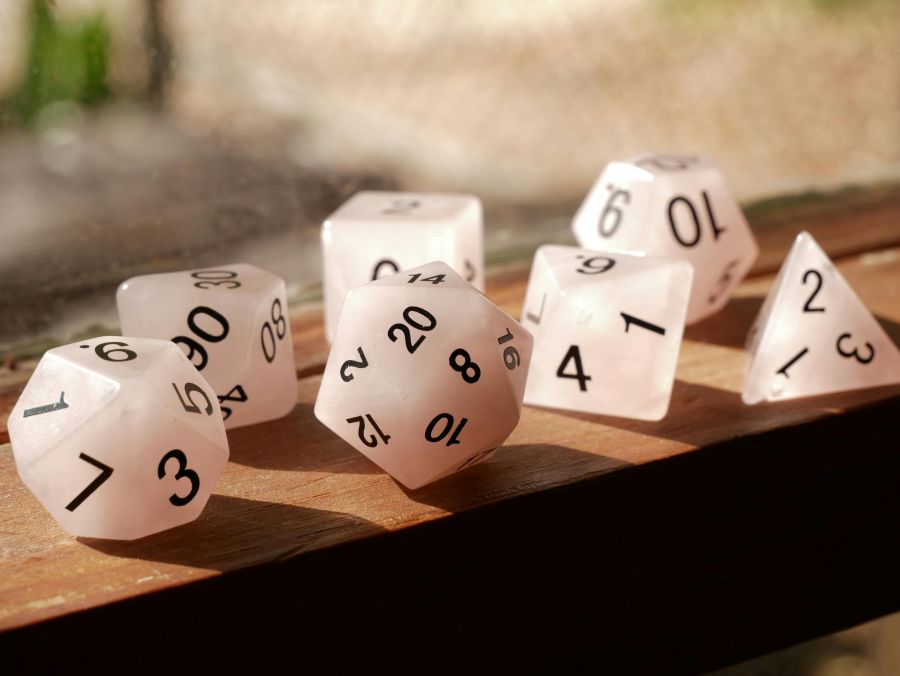Beat the "Not a Math Person" Myth & Succeed

Conquering the "I'm Not a Math Person" Myth: Unleash Your Inner Potential

The fear of mathematics and science is a common shadow that looms over many students. Often, this fear is more imaginary than real, yet it's relentlessly fed by each small error and perceived failure. It whispers the insidious idea: "You're just not cut out for this."
But what if that voice is wrong?
My own life experiences, and the stories of others, illuminate a powerful truth: the limitations we perceive in our abilities are frequently self-imposed by a closed mind. The moment we dare to open ourselves to new subjects, fresh perspectives, and the possibility that our initial assumptions might be incorrect, we unlock a universe of potential within. The very first step to learning, to shining, and to winning is simply to deploy that parachute of an open mind and allow ourselves to soar.
Personal Journeys: Discovering Unexpected Passions
My Story: How I Rediscovered the Beauty in Numbers
Throughout my early schooling, I firmly believed, "I'm just not a math person." While I adored Social Studies, Biology, and languages, I struggled immensely with algebra and geometry. The mere thought of a math class filled me with dread. Set theory seemed utterly boring, and silly calculation errors only amplified my anxiety as exams approached. This created a closed mindset, a barrier preventing me from truly engaging with the subject.
Everything changed in Class 8. A captivating math teacher revealed the elegant connections between mathematical equations and their myriad practical applications in daily life. He didn't just recite formulas; he told the stories behind them, unveiling the inherent beauty and logic within numbers. Inspired, I joined the public library and devoured books on the applications of Mathematics. Gradually, as I opened my mind, started asking questions, and dedicated myself to understanding the "why" behind the "how," a transformation occurred.
To my utter surprise, the fear began to dissipate, replaced by a burgeoning fascination. This newfound confidence fuelled my appreciation, initiating a virtuous positive cycle. I went on to excel in SSLC, Pre-Degree, and Engineering – all with distinction – using the very mathematics I once dreaded. My journey is a testament that the "math person" isn't born; they are often made when someone opens their mind to see a subject in a new light.
The Artist Who Discovered the Geometry of Form
A friend of mine, during his time at the College of Fine Arts, viewed math as the antithesis of creativity – a rigid, rule-bound discipline to be avoided at all costs. However, a sculpture workshop introduced him to the principles of perspective, the golden ratio, and the underlying geometric structures that informed the works of master artists throughout history. Suddenly, math wasn't just abstract equations; it was a language that could unlock deeper levels of beauty and harmony in his art. By opening his mind to explore these mathematical concepts, his sculptures gained a new dimension of precision and aesthetic appeal. He learned that seemingly disparate subjects can be profoundly interconnected, and a closed mind can severely limit one's creative potential.
Unlocking Your Math Potential: Practical Strategies for Success
Very few students are born with an innate, effortless talent for math. Most of us, like me, need to bridge that perceived gap with dedicated effort and deep study. Key ingredients for this journey include self-discipline, motivation, and a strong sense of responsibility. Let's uncover the roadmap to mathematical mastery, focusing on the following critical areas.
Laying the Foundation: Mindset and Motivation
- The Myth of "Natural Talent": Hard Work Trumps All: Remember that success in math is rarely about "natural talent" alone. Consistent hard work and a commitment to deep understanding are far more critical.
- Fuelling Your Engine: The Power of Motivation: Motivation is the driving force, like the battery in an electric vehicle. Our motivational engines need frequent recharging. For some, the charge lasts longer; for others, it needs topping up at shorter intervals. Find what keeps your engine running.
- Embracing "Problems": Your Gateway to Real-World Solutions: Does the word "problem" in math scare you? It might sound negative, but each math problem you solve is often a simplified version of a real-life challenge. Mathematics is a powerful tool, like a screwdriver or wrench, for tackling everyday issues. When you learn math, you're learning to solve actual real-world dilemmas.
Making Math Engaging and Accessible
- Play Your Way to Understanding: The Power of Games: Make math interesting and enjoyable by harnessing the power of games. Chess, Sudoku and Monopoly (there are many more!), teach strategic planning, quick calculation, and mental agility – all essential skills for math. Even playing ball games can enhance math skills and mental dexterity.
- Beyond the Classroom: Real-World Exposure: Consider trips to museums, science centers, or even field trips related to mathematical concepts. Such experiences can be stepping stones to overcoming confidence issues and motivating a student to enjoy learning. Self-confidence is invaluable in the world of math, and a playful, relaxed environment makes learning significantly easier.
- The Art of Memory: Using Creativity for Retention: The arts can be an irreplaceable tool. Drawing, for instance, can motivate students to use math in fun and innovative ways, while also developing long-term memory. Repetition of problems and solutions helps embed them in the mind, ready for extraction when needed.
- Music and Math: A Harmonious Connection: Let math be fun! Encourage taking up music lessons – guitar, piano, keyboard, or even drums. This not only imparts a new skill but also teaches math in a way that's often unnoticed. Every form of music relies on mathematical principles (e.g., rhythm, intervals, patterns).
- The Magic of Stories: Learning Through Narratives: Utilize story programs or incorporate storytelling into learning. Through engaging narratives, students can learn the fundamentals of math in a way that makes the subject sought after. Every student enjoys a good story!
Effective Study Habits for Lasting Comprehension
- Don't Rush to the Answer: Embrace the Struggle: When you get stuck on a problem, resist the immediate urge to look up the answer. Wrestling with it for a while is far more beneficial, as you might discover new ways to understand the problem, even if you eventually need to check the solution.
- Beyond Watching: Active Learning is Paramount: You cannot learn mathematics by passively watching your teacher lecture or solve problems. You must be actively involved in the learning process, both inside and outside the classroom. Attend classes, pay attention, and engage.
- Understanding vs. Memorizing: Making Formulas Your Allies: You'll need to do more than just memorize a set of formulas; you must understand how to USE them. For instance, the quadratic formula requires the quadratic equation to be in standard form first. Many formulas are general and require you to identify how parts of your problem correspond to parts of the formula. Without understanding the underlying principles, a memorized formula is often worthless. In calculus, memorizing the integration by parts formula is easy; understanding how to apply it effectively is the real challenge.
- The Cumulative Nature of Math: Building Brick by Brick: Mathematics follows a natural, cumulative progression. Each topic or course is like a brick you lay in a foundation. The next chapter builds upon the previous one. You must master the foundational concepts before moving on – like stacking LEGO blocks or building a house of cards. Almost everything you do in a math class will depend on subjects you’ve previously learned.
- Mastering the Basics: The Indispensable Foundation: If you don’t understand Chapter 1, you’ll likely struggle with Chapter 2. A college algebra class will be incredibly difficult without a solid grasp of high school algebra. You can't tackle calculus without first understanding Algebra and Trigonometry.
- Ask, Ask, Ask... Search, Search, Search: If you don’t understand something, ask! Ask your teacher, your friends, search the internet, watch educational YouTube videos, or visit the library. Remember, you are rarely the only one who doesn’t understand.
- Practice, Practice, Practice: The Cornerstone of Proficiency: The only way to learn how to do math problems is by working through them – more and more of them. The more you practice, the better prepared you will become.
Optimizing Your Study Process
- Keep a Diary and Stay Organized: Master Your Time: With part-time work, social life, social media, and studies, time management is crucial. Create a schedule that includes all your study sessions, classes, and other activities, and stick to it. Maintain a personal diary to track time-wasters and value-adders.
- Review and Revise: Solidify Your Understanding: Proceeding to the next topic without fully understanding the previous one breeds stress and erodes confidence. Review what you've studied and tackle any problems as they arise by asking questions. This eases worries and helps you build a strong foundation, stone by stone. Explaining ideas to friends can also significantly broaden your understanding.
- The Power of Perspiration: The "99% Rule" in Math: Anything worthwhile is typically achieved through 99% perspiration and 1% inspiration. The same holds true for mathematics. Think of Edison and the relentless struggles of countless individuals to achieve mastery or create masterpieces in all aspects of life.
- Join a Study Group: Benefit from Diverse Perspectives: Working with others can expose you to different perspectives on a problem and new ways to approach it.
- Visualize to Solve: The Clarity of Diagrams: Draw a diagram and label what you know and what you need to find. Often, a visual representation will help illuminate the path to a solution.
- Start Simple: Tackle Complex Problems Incrementally: You wouldn’t try to lift 100 kg in the gym on day one. You start with smaller weights, build muscle, develop technique, and gradually move up. Similarly, if you can’t solve a difficult math problem, find a similar but simpler one. Work through it and then return to the more complex challenge, applying what you learned.
- No Cramming Allowed: The Imperative of Consistent Study: As my initial story illustrated, I tackled my poor performance and fear through progressive improvement, not last-minute cramming. Start studying many days before an exam. Do NOT begin the night before. Cramming simply doesn’t work for math.
- Rework Problems Meticulously: Beyond Passive Reading: Do not just read over problems. Meticulously rework them. Writing down the steps will help you remember them. Always attempt to do problems without looking at the solutions. Cover up the solutions in examples from your notes or textbook and try to rework them yourself.
Learning from Mistakes: Your Stepping Stones
- Tackling Silly Errors: Slow Down and Double-Check: Address silly arithmetic or notational errors by consciously slowing down as you work through problems. These errors often happen when you're in a hurry and not fully aware of what you're doing.
- Analyzing Continuous Errors: Identify the Root Cause: If you consistently make errors on a particular type of problem, you probably don’t have a solid grasp of the underlying concept. If you bake a cake and it burns, you’d ask yourself “what happened and why?” or do a "Failure Analysis" to understand why. Do the same for math problems. Is it a lack of conceptual understanding? Weakness in foundational basics?
- Create an Error List: Study Your Patterns: Compile a list of the errors you keep making. Do you see any pattern? For each error, write down the correct method or solution. Review this list often and check if you’ve made any of your "common" errors.
Preparing for Success: Effective Exam Strategies
- Take Practice Exams: Simulate Real Conditions: All great athletes practice rigorously. During my school swimming days, I attended weeks of coaching camps before major events, even practicing with my hands or legs tied to simulate harsher conditions and improve my 100-meter backstroke time. Similarly, take many practice tests under exam-like conditions: give yourself a time limit and don’t use your notes or textbook.
The Winning Mindset: Perseverance and Positivity
- Embrace the Challenge: Learning to Love the "Exotic": In a previous post on how enjoying any subject can be like learning to love exotic food – be it Sushi, Caviar, Sambhar, or Tom Yam Kung. There will be some topics that require significant effort before you completely understand them. You will need to think about it, work many problems, and persevere. Soon, you may find that a topic you once thought was an insurmountable climb has transformed into a beautiful meadow.
- Banish "I Can't": Cultivate a "Can-Do" Attitude: Adopt a positive attitude. Believe "I can." Cut the "T" from "CAN'T." Always strive to do your best.
- Stay Cool and Relax: The Key to Performing Under Pressure: This is one of the hardest things to do in an exam, but it's crucial. The more worked up and nervous you are, the more likely you are to forget something or blank out. Panicking is the worst thing you can do. This is where practice and simulated exam conditions come to your rescue. Pilots train in flight simulators for storms, technical errors, and emergencies; they are trained not to panic but to remain cool and relaxed. Military personnel and commandos undergo similar training and simulate “War Games” to acclimatize themselves to stay calm even in life-and-death situations.

